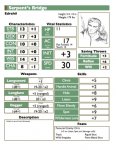WinningerR
Adventurer
WizarDru said:Ray, thanks for you insights, and welcome to the boards. It's always nice when an industry professional stops by to shed some light on things.
Glad to be here, thanks.
WizardDru said:A factor I'm curious about is the U.S. economy itself. I can't speak for others, but I know that my income became much more constrained when I went to college, and stayed that way from 1986-1991, roughly. I still didn't purchase as much until about 1998 or so. I didn't drop much coin on RPGs again until 2000, with the advent of 3E, and stayed that way until my unemployment in 2002. With my remployment in late 2002, things reversed and now I drop a good chunk on RPGs...moreso as the economy has improved.
It's certainly possible that the macro economy has had an impact on RPG sales, though I think there are more significant factors. Think about the internet, for instance. It's hard to imagine today, but back in the late 80s and the early 90s, places like EN World or RPG.NET didn't exist. Sure, there was some discussion of RPGs on usenet and AOL, but it was low-traffic and cumbersome. If you were really consumed with RPGs in those days and wanted fresh ideas, wanted to know what other RPG enthusiasts were thinking and so forth, your only option was to purchase RPG products (magazines like DRAGON, sourcebooks, adventures, whatever). These days, whatever system you play, you can easily fill up dozens of hours each week discussing the game on line, trading ideas, downloading variant rules, and so forth. That's certainly had an impact.
Similarly, I think it's safe to say that some of the money that goes to CCGs, collectible miniatures and other relatively new product categories used to go to RPGs. Yes, I know that some people deny this, but to me it seems almost self-evident. For years, the old wargame crowd denied that their waning fortunes were partially due to the rise of RPGs, too. Undoubtedly, RPGs have a lost a few dollars to various computer/console games as well.
You also have to look at what's been happening at the other tiers of the industry. There aren't nearly as many FLGSs or comic book shops these days as there were during the early 90s -- that too has had an impact.
Perhaps most importantly, I think the industry does an increasingly poor job of recruiting new gamers. D&D 3E is far less accessible to new players than the old TSR offerings and nobody has picked up the slack.

